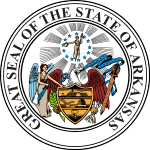| |||||||||||||||||
| |||||||||||||||||
 County results Caraway: 50–60% 60–70% 70–80% 80–90% >90% | |||||||||||||||||
| |||||||||||||||||
| Elections in Arkansas |
|---|
 |
The 1938 United States Senate election in Arkansas took place on November 8, 1938. Incumbent Senator Hattie Caraway ran for a second term in office. After narrowly defeating U.S. Representative John Little McClellan in the Democratic primary, she easily won the general election over Republican C.D. Atkinson.
Contents
Caraway, already the first woman elected to the U.S. Senate, became the first woman elected to a second term in office.


